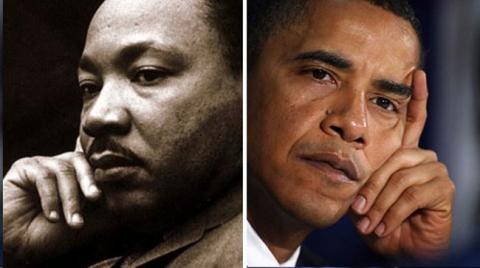50 Years Later, Civil Rights Leaders Face Daunting Challenges

From our content partner, New America Media:
The 50th anniversary of the monumental 1963 March on Washington was accompanied by a wave of commemorative events that tried hard to recapture the energy and the spirit of the 1963 March. This was a tall order. The original march, punctuated by Dr. Martin Luther King, Jr.'s towering "I Have a Dream" speech, acted as a powerful wrecking ball that crumbled the walls of legal segregation and ushered in an era of unbridled opportunities for many blacks. The results are unmistakable today. Blacks are better educated, more prosperous, own more businesses, hold more positions in the professions, and have more elected officials than ever before.
Yet the towering racial improvements since the 1963 March on Washington mask the harsh reality: The challenges 50 years later are, in some ways, more daunting than what King and other civil rights leaders faced.
When King marched in 1963, black leaders had already firmly staked out the moral high ground for a powerful and irresistible civil rights movement. It was classic good versus evil. Many white Americans were sickened by the gory news scenes of baton-battering racist Southern sheriffs, fire hoses, police dogs, and Klan violence unleashed against peaceful black protesters. Racial segregation was considered immoral and indefensible, and the civil rights leaders were hailed as martyrs and heroes in the fight for justice.
As America unraveled in the 1960s in the anarchy of urban riots, campus takeovers, and anti-war street battles, the civil rights movement and its leaders fell apart, too. Many of them fell victim to their own success and failure. When they broke down the racially restricted doors of corporations, government agencies, and universities, it was middle-class blacks, not the poor, who rushed headlong through them. As King embraced the rhetoric of the militant anti-war movement, he became a political pariah shunned by the White House, as well as mainstream white and black leaders.
King's murder in 1968 was a turning point for race relations in America. The self-destruction from within and political sabotage from outside of black organizations left the black poor organizationally fragmented and politically rudderless. The black poor, lacking competitive technical skills and professional training, and shunned by many middle-class black leaders, became expendable jail and street and cemetery fodder. Some turned to gangs, guns and drugs to survive.
A Pew study specifically released to coincide with the 50th anniversary celebrations graphically made the point that the economic and social gaps between whites and African-Americans have widened over the last few decades despite massive spending by federal and state governments, state and federal civil rights laws, and two decades of affirmative action programs. The racial polarization has been endemic between blacks and whites on everything from the George Zimmerman trial to just about every other controversial case that involves black and white perceptions of the workings of the criminal justice system.

A half-century later, the task of redeeming King’s dream means confronting the crises of family breakdown, the rash of shamefully failing public schools, racial profiling, urban police violence, the obscene racial disparities in the prison and criminal justice system, and HIV/AIDS. These are beguiling problems that sledgehammer the black poor and these are the problems that King and the civil rights movement of his day only had begun to recognize and address. Civil rights leaders today also have to confront something else that King did not have to face. King had the sympathy and goodwill of millions of whites, politicians, and business leaders in the peak years of the civil rights movement. Much of that goodwill has vanished in the belief that blacks have attained full equality.
Then there’s the reality that race matters in America can no longer be framed exclusively in black and white. Latinos and Asians have become major players in the fight for political and economic empowerment and figure big in the political strategies of Democratic and Republican presidential contenders. Today’s civil rights leaders will have to figure out ways to balance the competing and sometimes contradictory needs of these and other ethnic groups and patch them into a workable coalition for change.
It's grossly unfair to expect today’s civil rights leaders to be the charismatic, aggressive champions of, and martyrs for, civil rights that King was. Or to think that 50 years later, another March on Washington can solve the seemingly intractable problems of the black poor. The times and circumstances have changed too much for that. Still, civil rights leaders can draw strength from King's courage, vision and dedication and fight the hardest they can against racial and economic injustices that have hardly disappeared. This is still a significant step toward redeeming King’s dream.
Author Bio:
Earl Ofari Hutchinson is an author and political analyst.
Photos: New America Media; USIA--Wikipedia Commons.





























































































































































































































































































































